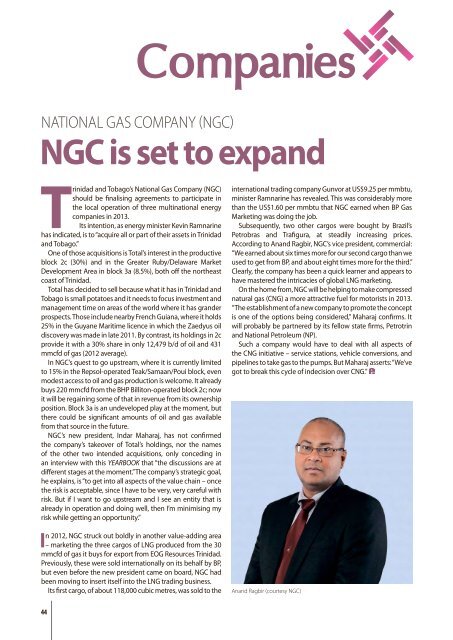ENERGY Caribbean Yearbook (2013-14)
- No tags were found...
Create successful ePaper yourself
Turn your PDF publications into a flip-book with our unique Google optimized e-Paper software.
Companies<br />
National gas company (NGC)<br />
NGC is set to expand<br />
Trinidad and Tobago’s National Gas Company (NGC)<br />
Countries<br />
should be finalising agreements to participate in<br />
the local operation of three multinational energy<br />
companies in <strong>2013</strong>.<br />
Its intention, as energy minister Kevin Ramnarine<br />
has indicated, is to “acquire all or part of their assets in Trinidad<br />
and Tobago.”<br />
One of those acquisitions is Total’s interest in the productive<br />
block 2c (30%) and in the Greater Ruby/Delaware Market<br />
Development Area in block 3a (8.5%), both off the northeast<br />
coast of Trinidad.<br />
Total has decided to sell because what it has in Trinidad and<br />
Tobago is small potatoes and it needs to focus investment and<br />
management time on areas of the world where it has grander<br />
prospects. Those include nearby French Guiana, where it holds<br />
25% in the Guyane Maritime licence in which the Zaedyus oil<br />
discovery was made in late 2011. By contrast, its holdings in 2c<br />
provide it with a 30% share in only 12,479 b/d of oil and 431<br />
mmcfd of gas (2012 average).<br />
In NGC’s quest to go upstream, where it is currently limited<br />
to 15% in the Repsol-operated Teak/Samaan/Poui block, even<br />
modest access to oil and gas production is welcome. It already<br />
buys 220 mmcfd from the BHP Billiton-operated block 2c; now<br />
it will be regaining some of that in revenue from its ownership<br />
position. Block 3a is an undeveloped play at the moment, but<br />
there could be significant amounts of oil and gas available<br />
from that source in the future.<br />
NGC’s new president, Indar Maharaj, has not confirmed<br />
the company’s takeover of Total’s holdings, nor the names<br />
of the other two intended acquisitions, only conceding in<br />
an interview with this YEARBOOK that “the discussions are at<br />
different stages at the moment.” The company’s strategic goal,<br />
he explains, is “to get into all aspects of the value chain – once<br />
the risk is acceptable, since I have to be very, very careful with<br />
risk. But if I want to go upstream and I see an entity that is<br />
already in operation and doing well, then I’m minimising my<br />
risk while getting an opportunity.”<br />
In 2012, NGC struck out boldly in another value-adding area<br />
– marketing the three cargos of LNG produced from the 30<br />
mmcfd of gas it buys for export from EOG Resources Trinidad.<br />
Previously, these were sold internationally on its behalf by BP,<br />
but even before the new president came on board, NGC had<br />
been moving to insert itself into the LNG trading business.<br />
Its first cargo, of about 118,000 cubic metres, was sold to the<br />
international trading company Gunvor at US$9.25 per mmbtu,<br />
minister Ramnarine has revealed. This was considerably more<br />
than the US$1.60 per mmbtu that NGC earned when BP Gas<br />
Marketing was doing the job.<br />
Subsequently, two other cargos were bought by Brazil’s<br />
Petrobras and Trafigura, at steadily increasing prices.<br />
According to Anand Ragbir, NGC’s vice president, commercial:<br />
“We earned about six times more for our second cargo than we<br />
used to get from BP, and about eight times more for the third.”<br />
Clearly, the company has been a quick learner and appears to<br />
have mastered the intricacies of global LNG marketing.<br />
On the home from, NGC will be helping to make compressed<br />
natural gas (CNG) a more attractive fuel for motorists in <strong>2013</strong>.<br />
“The establishment of a new company to promote the concept<br />
is one of the options being considered,” Maharaj confirms. It<br />
will probably be partnered by its fellow state firms, Petrotrin<br />
and National Petroleum (NP).<br />
Such a company would have to deal with all aspects of<br />
the CNG initiative – service stations, vehicle conversions, and<br />
pipelines to take gas to the pumps. But Maharaj asserts: “We’ve<br />
got to break this cycle of indecision over CNG.”<br />
Anand Ragbir (courtesy NGC)<br />
44


















